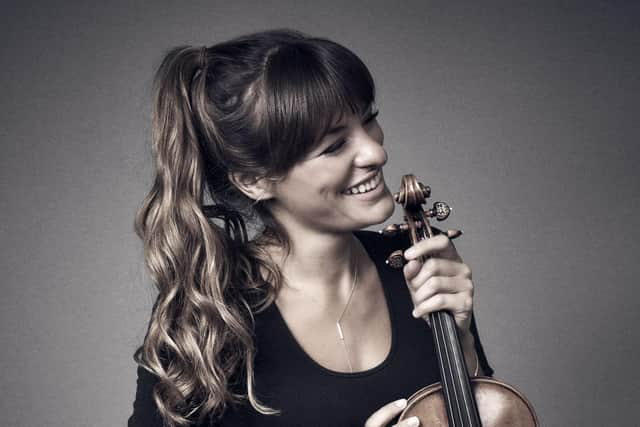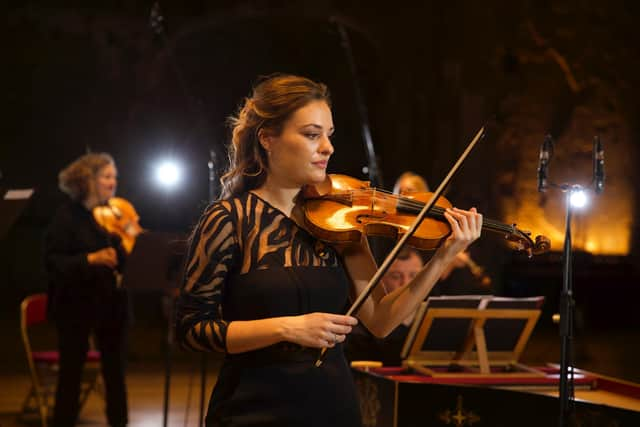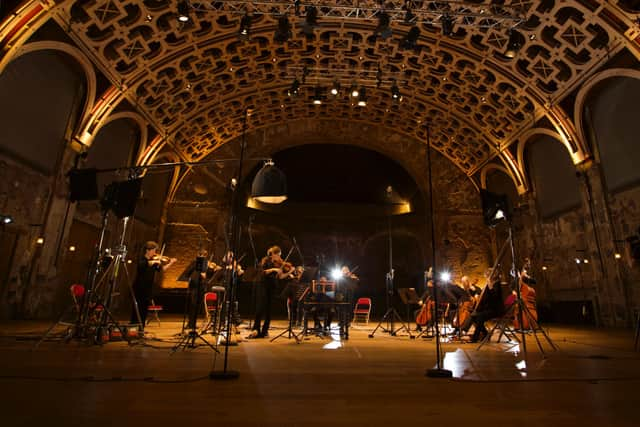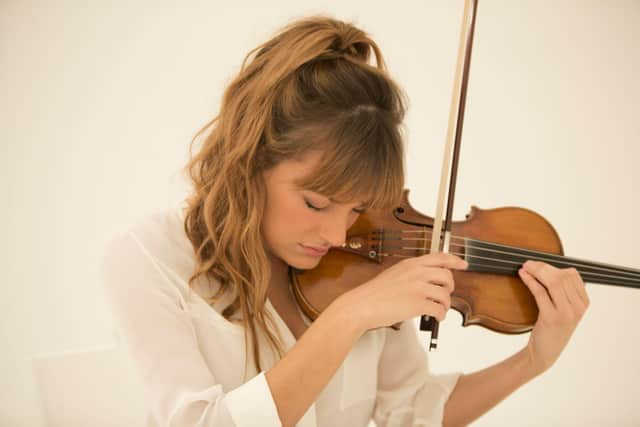Nicola Benedetti: "The EIF are having such a celebration of what’s local this year"


Ask Nicola Benedetti when she first played at the Edinburgh International Festival and for someone who is usually in instant control of the facts the response is one of uncommon hesitancy. “Ah”, she eventually gasps. “It wasn’t a good thing; it was Mendelssohn, outside.”
Which, by my recollection, was a performance with the Scottish Chamber Orchestra at the Ross Bandstand in Princes Street Gardens full of untimely intrusions: an ice cream van issuing its come-and-buy jingle as a queer counterpoint to the lilting Andante of Mendelssohn’s Violin Concerto; RAF Tornadoes roaring over the Castle ramparts in a timed flypast for the Tattoo that coincided precisely with Benedetti’s curtain call, causing the entire cast to duck in instant trepidation.
Advertisement
Hide AdAdvertisement
Hide AdShe doesn’t recall these interruptions. More memorable for the 34-year-old Ayrshire-born violinist was her “real” International Festival debut in 2012 – a performance at the Usher Hall with the London Symphony Orchestra of Szymanowski’s Violin Concerto No 1 under the baton of Valery Gergiev. It was a work she felt naturally comfortable with, especially having played it in the same venue eight years previously in her career-changing triumph as winning finalist of that year's BBC Young Musician competition.


“The Festival was a very different experience,” she says. “Gergiev had never conducted the Szymanowski before, and he came to see me about 15 minutes before the performance and was asking me about stuff in the score. I think that day was the first time he’d actually opened the music.” That it came off so well left her with the lasting memory that the eccentric Russian was “one of the greatest musicians I’ve met.”
Nowadays, Benedetti likes to be in complete control of what she does. She picks her moments – try getting an interview within her manic schedule. She also handpicks the music she plays, the people she plays it with and where, and she’s not backward in expressing views. Her week-long residency at this year’s Edinburgh International Festival, from 14-21 August, is a key moment for her. After a year of cancelled gigs, the prospect of performing for and relating to a live audience has naturally cheered her up.
“There are two things I was really sad about,” she says. “I lost a number of performances of Mark Simpson’s new Violin Concerto [she premiered it online with the LSO in April, but the Scottish premiere with the RSNO was among several performances which had to be postponed], and for the first time I had a couple of shared concerts planned with [close friend] Wynton Marsalis in Paris where his band were doing The Jungle, his last big symphony, alongside me doing his Violin Concerto. ”
Aside from the high-profile online coaching sessions that she and her hugely successful Benedetti Foundation have been heavily involved with throughout July, and some local London concerts with her newly-founded specialist group Benedetti Baroque, her EIF residency marks a significant comeback to the live arena, and to a festival she believes is setting the standard for how we can emerge positively from the confines of Covid.


“What the Edinburgh International Festival is demonstrating at the moment is a trend towards the increased juxtaposition of localised artists and the truly international,” she says. “The EIF are having such a celebration of what’s local this year, what’s here in Scotland. I think it’s something that will become more of a pattern for festivals all over the world.”
Above all, it could help stem the kind of bland uniformity that she believes had resulted from musicians’ previous ease of international travel. “What disturbs me is the lack of diversity, of identity, especially among orchestras. Basically orchestras play incredibly well. That’s what they do. There are a lot of orchestras all over the world that have worked out how to play the regular repertoire that we celebrate, which brings audiences into concert halls.”
Advertisement
Hide AdAdvertisement
Hide AdThe question that concerns Benedetti is: what marks out one performance from another?
“I’m not talking about superficial identity, about what everyone’s wearing, or the colours you put behind an orchestra, or even the location itself. If a year of online concerts has taught us anything, it’s that one concert hall can look very much like another. A more important question is about how you play, what is really identifiable about your musical voice and presentation? When orchestras like the RSNO tour abroad, for instance, I’m a big fan of them playing eightsome reels and all the usual Scots encores. And I think that identifying in that and other ways is relevant to what we’re talking about with this festival and its celebration this year of more local artists and organisations, especially coming out of a period where every individual has their laptop, and whatever they’ve been viewing they’ve been viewing from that laptop.”


For Benedetti’s fans, her Edinburgh International Festival residency is a unique opportunity to soak up all that characterises her own musical identity. She’ll star with her own Baroque ensemble, made up of musicians from various orchestras she’s collaborated with in recent years, in music by Vivaldi and Geminiani. “Putting together my own freelance Baroque ensemble for projects, tours and recordings is something I’ve wanted to do for a while,” she explains. A new Decca album, Baroque, featuring that same vivacious Mediterranean repertoire has just been released.
Hasn’t she been playing this stuff for years with some of the best period bands around? Why go it alone? “Yes, it’s very comfortable for me to fit in with the likes of Andrea Marcon and the Venice Baroque Orchestra, or Trevor Pinnock and the English Concert, or Richard Egarr and the Academy of Ancient Music. They have a language they have spoken intimately to one another for decades and it’s wonderful to slot into that as a guest soloist. But I have my own vision for Baroque music and how I want to tell that story.”
Much of that has been informed by preparation for her recent Benedetti Foundation workshops. Almost all the specialists she consulted had lived through the extreme orthodoxy of the late-20th century early music revival, but were now looking to challenge that and establish a greater diversity in how they communicate the music. “As with any new movement fighting for identity, for recognition, you naturally start needing to codify things and create rigid systems that allow you to be able to say this is what this is. That’s a necessary process. But as thoughts mature, there’s a counter to that. And I think a lot of the Baroque music world is now going through a new transformation, which is more open, more interesting, more dynamic.”
In a more contemporary guise, and with different collaborators, Benedetti will also spearhead a festival performance of Stravinsky’s dark and theatrical The Soldier’s Tale, his witty 1918 Faustian parable with virtuosic instrumentation and actors. It takes place, like the Baroque programme, in the outdoor pavilion at Edinburgh Royal Academy Junior School. Her solo programme, The Story of the Violin, is already tried and tested, a potted history of solo violin works, with conversational illustrations. Its intimacy is reflected in its location, the smaller pavilion in Edinburgh University’s Old College Quad.
As we speak, Benedetti bears the palpable hallmarks of an artist with little time to spare. Clearly occupying her thoughts are the demands of her hands-on involvement in the latest of her globally-successful workshops. Did lockdown not offer her a chance to recalibrate her notoriously hectic lifestyle?
Advertisement
Hide AdAdvertisement
Hide AdOn the one hand the answer is yes. “I think being able to step away a bit during the pandemic helped improve the physical relationship with my instrument,” she says. “I feel pretty much all the concerts I’ve done since lockdown have gone well but I’ve not been desperate to do a lot of travel for work.”
That was then; what about now? “I’m horribly busy at the moment,” she admits. “I have to remember I have a personal life, which is the part of the jigsaw that’s hard to maintain. In many ways I’m getting better at that, but I’ve done what most people did coming out of lockdown, which is to say yes to most stuff and get excited about the chance to do things again.
“But the pendulum can swing too far in the other direction. It’s my fault I’m crazily busy because I’m continually coming up with new ideas and my team, because they’re so incredibly good, just make them happen.”
In short, giving everything in her busy life 100 per cent is in Benedetti’s DNA. And with that comes a surefire belief in the future of classical music and the people and events charged with nurturing it. “I’m very optimistic,” she says. “A lot of people have come up with exciting new plans, new ideas. I think that there’s a huge amount of positivity coming out of young musicians. I personally have a lot of excitement about getting back to business. I have a lot to look forward to.”
For full details of Nicola Benedetti’s festival performances, see www.eif.co.uk
A message from the Editor
Thank you for reading this article. We're more reliant on your support than ever as the shift in consumer habits brought about by coronavirus impacts our advertisers.
If you haven't already, please consider supporting our trusted, fact-checked journalism by taking out a digital subscription at https://www.scotsman.com/subscriptions